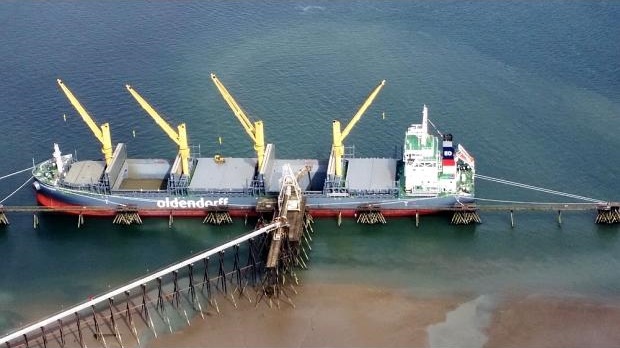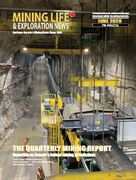Stephen Hume: Clark Needs to Step Up on Environment
B.C. is fast earning a reputation as a bungler, both at home and abroad, on key environmental concerns

A shipment of copper concentrate from the new Red Chris mine is loaded in Stewart. Mine Minister Bill Bennett’s assurances
about new mines near the Alaska border was received in Alaska with emotions ranging from icy disbelief to rage.
Wednesday’s agreement between Premier Christy Clark and Alaska Gov. Bill Walker promising protection for shared environments from new mining developments on trans-boundary salmon rivers won’t quell the grassroots opposition swelling in the Northern U.S. state.
In fact, it might even make things more difficult for B.C.’s ambitious northwest development plans. Alaskan First Nations, fishing and environmental groups are already signalling a desire to trigger U.S. federal intervention through the International Joint Commission under the 1909 Boundary Waters Treaty. What happened to the Northern Gateway and Keystone XL pipelines — once promoted as a sure thing to carry Alberta’s oilsands crude to tidewater — might serve as a cautionary examples.
And recent events in B.C. won’t up the credibility quotient for provincial promises.
Let’s see, in southern B.C. we have run-off that wasn’t supposed to be there flowing where it wasn’t supposed to go — into Shawnigan Lake — from a contaminated soil dump approved by the province on assurances that water shouldn’t, wouldn’t, couldn’t leave the site.
Environment Minister Mary Polak at first seemed to imply this wasn’t happening. Observers produced a video. The minister defaulted to the argument that even if water was coming off the site, it was safe.
Ministry officials then announced the province might suspend operations at the Cowichan Valley landfill. Why? Concerns about the operator’s ability to ensure that surface water be contained and treated on the site as permits require.
Local householders — not your usual dreadlocks and drums agitators — have been getting themselves arrested trying to block trucks hauling in more contaminated soil. They say they don’t trust their government.
Meanwhile, potential for crisis looms over the Mount Polley mine site, again. A temporary containment facility for tailings and water — approved over the objections of local First Nations — is apparently filling up with run-off faster than expected.
Municipal leaders, First Nations, even miners all warned last week that if the province doesn’t facilitate, the short-term containment pond may leak untreated contents into groundwater.
Worse, some fear it might already be too late to treat and release sufficient water to offset what’s entering and that a heavy winter snowfall and a quick spring melt will simply overflow.
Cariboo First Nations are furious. They say they warned the province that reopening the mine with temporary waste water containment was reckless. Mine workers are incensed by perceived foot-dragging on a permit to discharge treated water — which First Nations oppose. The mayor of Williams Lake warns mismanagement places the whole region at risk — the environment and the local economy with all the social fallout both entail. What a mess.
The common denominator? The province, which seems to lurch from shove-it-down-the-throat cantankerousness to regulatory timidity and rabbit-in-the-headlights process paralysis.
The big question that the premier must address when she returns from speechifying about how B.C. is a global leader in all things environmental is this: How does the province plan to counter the destructive effect of growing controversy over its apparent inability to manage what should be straightforward regulatory matters and the equally important optics surrounding them?
If citizens of B.C. lose trust in their own government, why assume that Alaskans would accept promises about the safety of mining development in the northwest, where new mines are planned and there are even bigger transboundary issues of fisheries and water quality?
Source: http://www.vancouversun.com/Stephen+Hume+Clark+needs+step+environment/11544341/story.html?__lsa=9734-667c

|